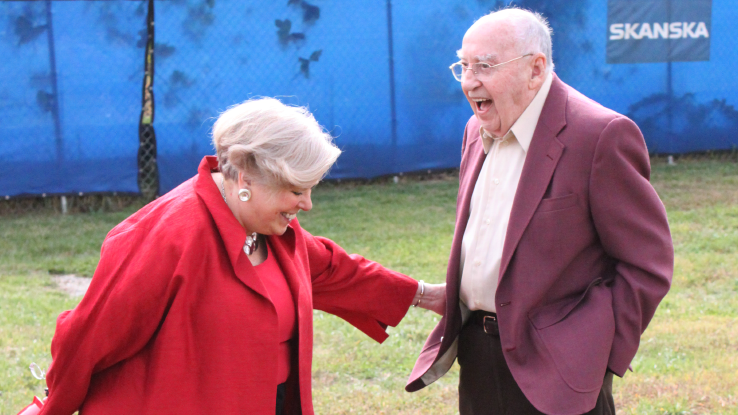
Former Vice Provost and Director of the Libraries Susan Nutter shares a laugh with the previous Director of the Libraries I.T. Littleton at the James B. Hunt Jr. Library groundbreaking in October of 2009.

Former Vice Provost and Director of the Libraries Susan Nutter shares a laugh with the previous Director of the Libraries I.T. Littleton at the James B. Hunt Jr. Library groundbreaking in October of 2009.
The NC State University Libraries community mourns the passing of former Libraries Director Isaac T. Littleton in August. He was 100 years old.
A Tennessee native, Littleton came to the University of North Carolina at Chapel Hill in 1939, working as a Junior Assistant in the Circulation Department of the UNC University Libraries. As the country entered World War II, Littleton joined the Navy’s V-7 officer training program and finished his bachelor’s degree in 1943 before beginning training at Northwestern University.
After serving 22 months in the amphibious corps with Service Squadron Ten in the Pacific, Littleton completed his Navy service with a nine-month stint as a counselor in three naval hospitals in California. Lieutenant Littleton left the Navy in 1946 and settled in Knoxville, Tennessee to work for the Veterans Administration as a training officer under the G. I. Bill and to attend the University of Tennessee where he met his wife Dorothy (Dot) Young—they were married in 1949. Littleton received a master’s degree in psychology from UT in 1950 and the Master’s in Library Science from the University of Illinois in 1951.
He returned to the UNC University Libraries to begin his professional career, spending eight years as Head of the Circulation Department and Assistant University Librarian. Littleton came to NC State in 1959 as Technical Services Librarian at the Hill Library. After a yearlong leave of absence to complete a Ph.D. in Library Science from the University of Illinois in Champaign-Urbana, he returned to Raleigh as Director of Libraries in 1964. He served at NC State for 28 years until his retirement in 1987.
Under Littleton's leadership, the Hill Library's collections increased dramatically—he was named “Tarheel of the Week” by The News & Observer when the collection reached its one-millionth volume in 1981—along with its physical space. During his tenure, the library became part of the Online Computer Library Center, the Southeastern Library Network, the Triangle Research Libraries Network, and the Association of Research Libraries. A member of several professional and honorary societies, Littleton was chairman of the University of North Carolina system's University Library Advisory Council, the Association of Southeastern Research Libraries, and the Southeastern Library Network. Littleton also started the Friends of the Library. The Libraries’ Special Collections Research Center is proud to house the Isaac Thomas Littleton Papers, a collection that contains his doctoral dissertation, personal correspondence, speeches, photographs, article drafts, and historical information on the Libraries.
Since his retirement, the Libraries has held an annual seminar in Littleton’s honor, hosting speakers such as Dr. Lucianne Walkowicz, Chair of Astrobiology at the Library of Congress and astronomer at the Adler Planetarium in Chicago; John Bracken, Vice President of the Media Innovation Program at the Knight Foundation; and Blaise Cronin, Dean of the School of Library and Information Science and Rudy Professor of Information Science at Indiana University. Littleton also sat down to record an oral history session with the Libraries in 2007 that is available to view here.
In a recent message to Libraries staff, Senior Vice Provost and Director of Libraries Greg Raschke recalled many of Littleton’s accomplishments, but noted that his character is his lasting legacy to the university. “Littleton was an early and outspoken proponent of integration and equality in Raleigh (along with his friend and long-time colleague Cy King),” Raschke wrote. “He spoke out against segregation when it put him and his family at professional and personal risk. He would be the first to recognize that the progress he envisioned has been much too slow, but it is worth taking a moment to recognize that folks like I.T.—folks who put what is right above what is easy—are part of the reason we have made progress. I.T. would tell you he benefited from privilege in his efforts to speak out, but he used that privilege with courage and consistency.”
Memorial contributions may be made to the NC State University Libraries, the Dorothy Young Littleton Endowment, or the Community United Church of Christ.